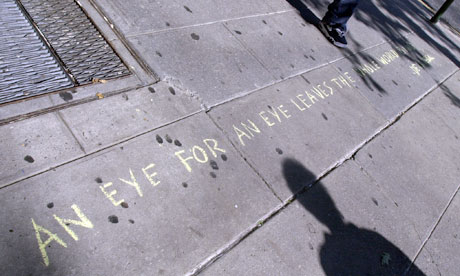
The words "police rap" conjure echoes of Grange Hill's Zammo and Roland awkwardly bopping around to some ill-conceived rhymes created to appeal exclusively to teachers and social workers. Add to the mix the Thames Valley town of High Wycombe, hardly the Bronx, and it all seems a bit, well, excruciating.
But when Thames Valley police decided to put out a rap single to help promote an anti-gang culture message, that was precisely what they wanted to avoid.
They've pulled it off. An Eye For An Eye sounds and feels like any other mainstream rap and there's not a bow-tied headmaster in sight.
The project was conceived after the police observed rival gangs posting antagonistic videos designed to bait each other on YouTube.
"We were looking at targeting an age group of anything from 12 to 20 and so we needed something fresh and relevant and that young people would actually identify with," says detective inspector Colin Seaton.
The track itself was created by local DJ, LoMotes, along with grime artists Styler, Sicx, Dimples and Treasure, all of whom donated their time and resources for nothing.
Filmed in Wycombe town centre and around local gang hot-spots, the video features a slick and catchy rap with a simple message, "An eye for an eye makes the whole world blind". It looks at the consequences (not least, jail) of gun crime and showcases some emerging talent in the process. The rap is available on iTunes and Amazon to download and all proceeds go towards the Ben Kinsella Trust, set up in memory of the 16-year-old school boy stabbed to death in London in June 2008, and other local youth community projects.
With more than 14,000 views on YouTube and retweets by US rappers, it's becoming an unlikely internet hit, partly due to the fact that the police have made their involvement unknown.
Wycombe might not seem to be the most desperate or needy place in the Thames Valley (it's one of the wealthiest regions in the EU) but, says Seaton: "Frankly, any stabbing is one too many. In our most recent shooting in January we made 12 arrests with the youngest just 12 years old, so anything we can do to prevent things like that happening we will.
"We can arrest people and lock them up but at the end of the day it's more deep-rooted than that."
The force already works with its Gang Multi-Agency Partnership (GMap) team to identify new ways of targeting gangs and keeping them out of the criminal justice system. It's already run a Coveritlive event, a community meeting online whereby people can log on to a liveblogging platform and ask any questions (including those on how the police are tackling gang crime), during which they streamed the video, to a positive response.
Twenty-seven-year-old DJ LoMotes (aka Ghana-born Larry Lomotey) admits he was a bit worried at first that the project might end up being a bit "forced" but in the end, he says, "I had complete creative control".
Lomotey chose the artists, the studio and the vibe and their only remit was that the song contained an anti-gang message. All the artists, including Lomotey, have grown up with the threat of gang crime, if not in the heart of it (Lomotey has been threatened at knifepoint), so they all had something to say.
"None of the artists had written a word until they came into the studio," says Lomotey, "but I played a loop and they rapped and sang. It was impressive. At the end of three days we had two really great songs". The second of which he plans to release for free in September.
The collaboration isn't ending here. Lomotey and Thames Valley police are keen to do more and after the collective has performed at the High Wycombe Festival on 5 August, Lomotey plans to do something annually, perhaps even creating a regular music festival around the collective.
"What we mainly want," though, he says with a smile, "is for people to love, and buy, the song."
This article is published by Guardian Professional. Join the social care network to receive regular emails and exclusive offers.

